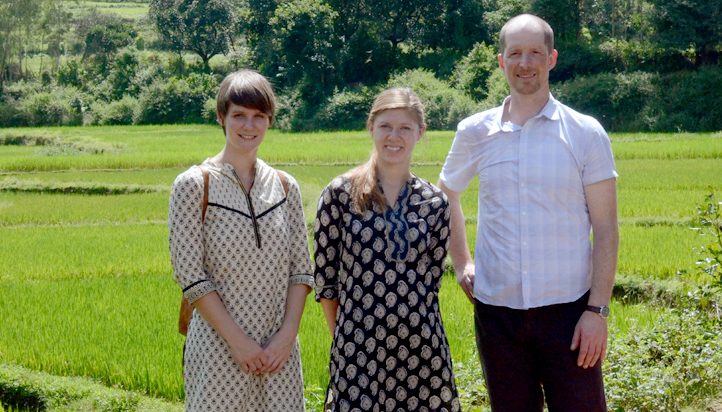
Derek Johnson and two of his master’s students
Small millets: Exploring a key to food security and agro-ecological health in India, Nepal and Sri Lanka
WHO: Anthropology professor Derek Johnson and his graduate students and post-doctoral fellows Sarah Carson, Laura Husak, Lakshman Kalasapudi, Hom Gartaula and Dinesh Moghariya.
WHAT: A project that partners Canadian Universities with NGOs in South Asia to promote agricultural biodiversity and improve food security.
THE GOAL: To help reverse the drop in production and consumption of small millets in India, Nepal and Sri Lanka.
WHY IT’S IMPORTANT: Small millets are more nutritious than other staple grain crops and therefore particularly good for combatting malnutrition and disease. These drought-tolerant crops are also well suited for diverse conditions brought on by climate change and are a traditional food in much of South Asia.
HOW IT WORKS: The U of M and its partners are seeking to rekindle interest for small millets in South Asia through a variety of innovative engagements with farmers, traders and government policy-makers. For example, partner NGOs pushed to have millets included in several government food security initiatives.
THE INSPIRATION: “We are motivated by the potential that small millets offer for the promotion of human well-being and ecological sustainability. We are also motivated to critically understand the development process,” says Johnson. “The people with whom we are working lead rich and varied lives. They engage creatively with the possibilities available to them and seek the best for themselves and their children.”
A MOMENT THAT MATTERED: “[A member of the research team] witnessed an interaction between a plant breeder and a farmer during which the breeder acknowledged how important farmer seed saving and exchange practices are for agricultural biodiversity. This was a recognition of the value of indigenous knowledge,” Johnson says.
FUNDERS: The International Development Research Centre and the Department of Foreign Affairs, Trade and Development
LEARN MORE






